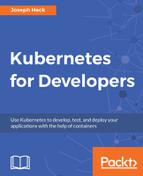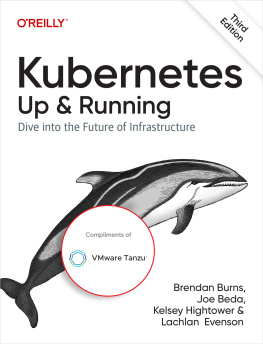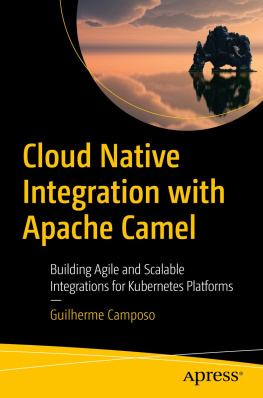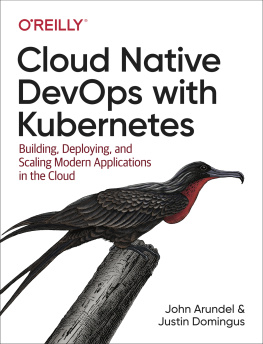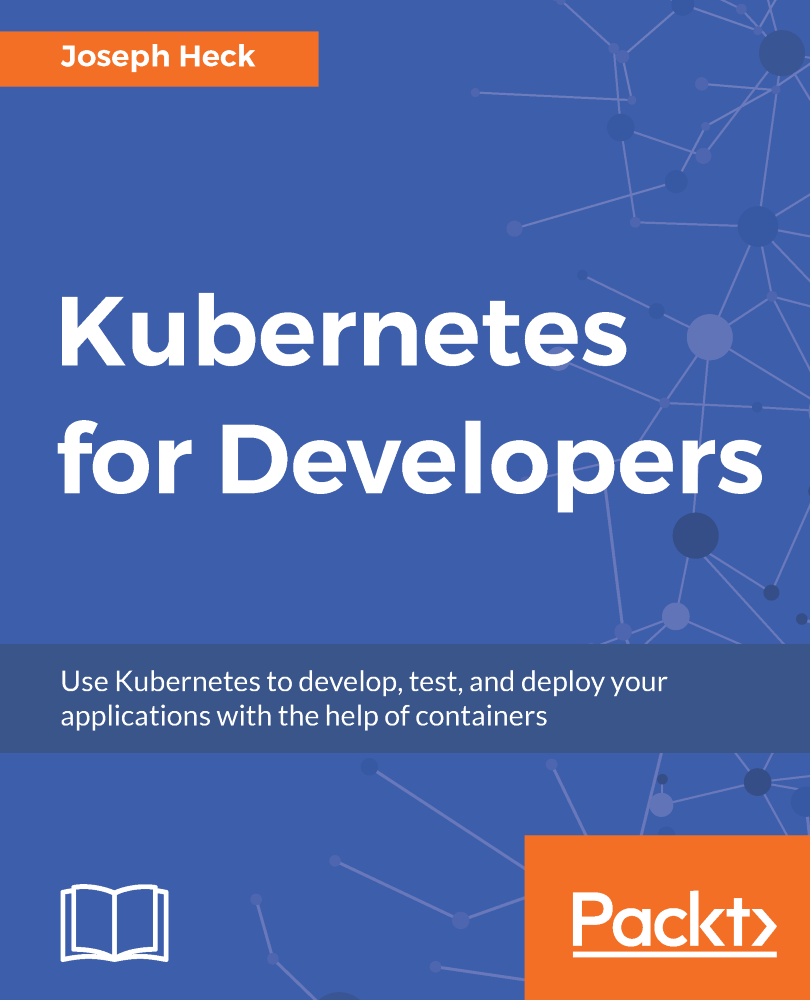
Kubernetes for Developers
Use Kubernetes to develop, test, and deploy your applications with the help of containers
Joseph Heck

BIRMINGHAM - MUMBAI
Kubernetes for Developers
Copyright 2018 Packt Publishing
All rights reserved. No part of this book may be reproduced, stored in a retrieval system, or transmitted in any form or by any means, without the prior written permission of the publisher, except in the case of brief quotations embedded in critical articles or reviews.
Every effort has been made in the preparation of this book to ensure the accuracy of the information presented. However, the information contained in this book is sold without warranty, either express or implied. Neither the author, nor Packt Publishing or its dealers and distributors, will be held liable for any damages caused or alleged to have been caused directly or indirectly by this book.
Packt Publishing has endeavored to provide trademark information about all of the companies and products mentioned in this book by the appropriate use of capitals. However, Packt Publishing cannot guarantee the accuracy of this information.
Commissioning Editor: Gebin George
Acquisition Editor: Rahul Nair
Content Development Editor: Sharon Raj
Technical Editor: Prashant Chaudhari
Copy Editor: Safis Editing
Project Coordinator: Virginia Dias
Proofreader: Safis Editing
Indexer: Priyanka Dhadke
Graphics: Tom Scaria
Production Coordinator: Deepika Naik
First edition: April 2018
Production reference: 1050418
Published by Packt Publishing Ltd.
Livery Place
35 Livery Street
Birmingham
B3 2PB, UK.
ISBN 978-1-78883-475-9
www.packtpub.com
mapt.io
Mapt is an online digital library that gives you full access to over 5,000 books and videos, as well as industry leading tools to help you plan your personal development and advance your career. For more information, please visit our website.
Why subscribe?
Spend less time learning and more time coding with practical eBooks and Videos from over 4,000 industry professionals
Improve your learning with Skill Plans built especially for you
Get a free eBook or video every month
Mapt is fully searchable
Copy and paste, print, and bookmark content
PacktPub.com
Did you know that Packt offers eBook versions of every book published, with PDF and ePub files available? You can upgrade to the eBook version at www.PacktPub.com and as a print book customer, you are entitled to a discount on the eBook copy. Get in touch with us at service@packtpub.com for more details.
At www.PacktPub.com , you can also read a collection of free technical articles, sign up for a range of free newsletters, and receive exclusive discounts and offers on Packt books and eBooks.
Contributors
About the author
Joseph Heck has broad development and management experience across start-ups and large companies. He has architected, developed, and deployed a wide variety of solutions, ranging from mobile and desktop applications to cloud-based distributed systems.
He builds and directs teams and mentors individuals to improve the way they build, validate, deploy, and run software. He also works extensively with and in open source, collaborating across many projects, including Kubernetes.
About the reviewers
Paul Adamson has worked as an Ops engineer, a developer, a DevOps engineer, and all variations and mixes of these. When not reviewing this book, he keeps busy helping companies embrace the AWS infrastructure. His language of choice is PHP for all the good reasons and even some of the bad ones, but mainly habit. Apart from reviewing this book, he has been working for Healthy Performance Ltd., helping to apply cutting-edge technology to a cutting-edge approach to wellbeing.
Jakub Pavlik is a co-founder, former CTO, and chief architect of tcp cloud who has worked several years on the IaaS cloud platform based on OpenStack-Salt and OpenContrail projects, which were deployed and operated for global large service providers. Currently as the director of product engineering, he collaborates on a new Mirantis Cloud Platform for NFV/SDN, IoT, and big data use cases based on Kubernetes, containerized OpenStack, and OpenContrail. He is a member of the OpenContrail Advisory Board and is also an enthusiast of Linux OS, ice hockey, and films. He loves his wife, Hanulka.
Packt is searching for authors like you
If you're interested in becoming an author for Packt, please visit authors.packtpub.com and apply today. We have worked with thousands of developers and tech professionals, just like you, to help them share their insight with the global tech community. You can make a general application, apply for a specific hot topic that we are recruiting an author for, or submit your own idea.
Preface
It's getting more common to find yourself responsible for running the code you've written as well as developing the features. While many companies still have an operations group (generally retitled to SRE or DevOps) that help with expert knowledge, developers (like you) are often being asked to expand your knowledge and responsibility scope.
There's been a shift to treating infrastructure-like code for some time. Several years ago, I might have described the boundary as Puppet is used by operations folks and Chef is used by developers. All of that changed with the advent and growth first of clouds in general, and more recently with the growth of Docker. Containers provide a level of control and isolation, as well as development flexibility, that is very appealing. When using containers, you quickly move to where you want to use more than one container a time, for isolation of responsibility as well as horizontal scaling.
Kubernetes is a project open sourced from Google, now hosted by the cloud-native computing foundation. It exposes many of the lessons from Google's experience of running software in containers and makes it available to you. It encompasses not only running containers, but grouping them together into services, scaling them horizontally, as well as providing means to control how these containers interact together and how they get exposed to the outside world.
Kubernetes provides a declarative structure backed with an API and command-line tools. Kubernetes can be used on your laptop, or leveraged from one of the many cloud providers. The benefit of using Kubernetes is being able to use the same set of tools with the same expectations, regardless of running it locally, in a small lab at your company, or in any number of larger cloud providers. It's not exactly the write once, run anywhere promise of Java from days gone by; more we'll give you a consistent set of tools, regardless of running on your laptop, your company's datacenter, or a cloud provider such as AWS, Azure, or Google.
Next page

